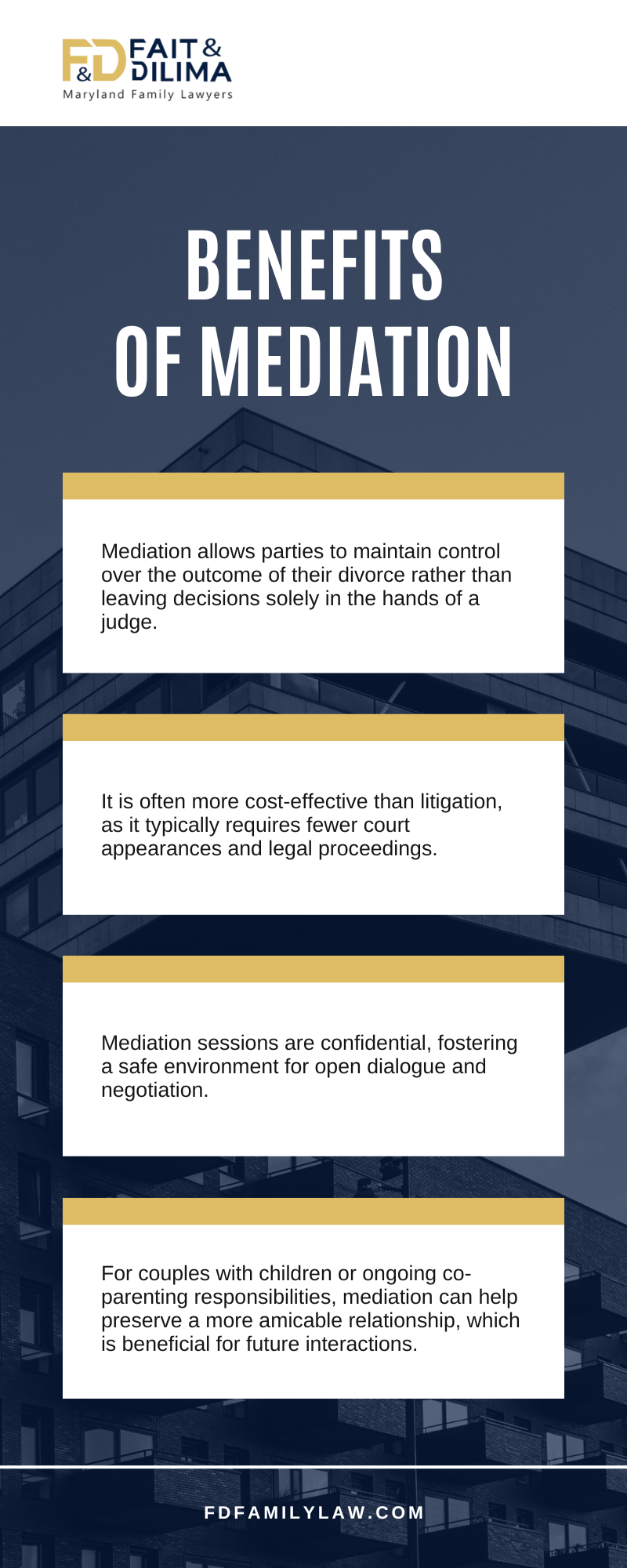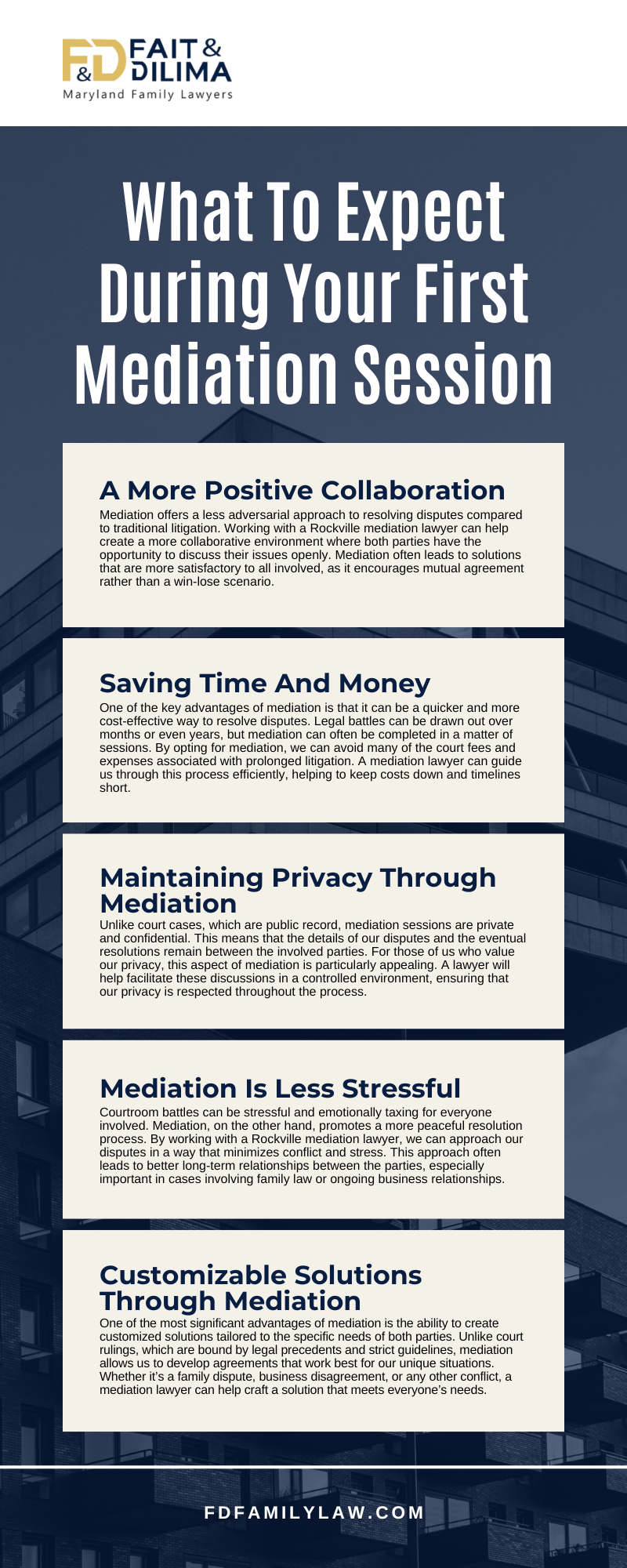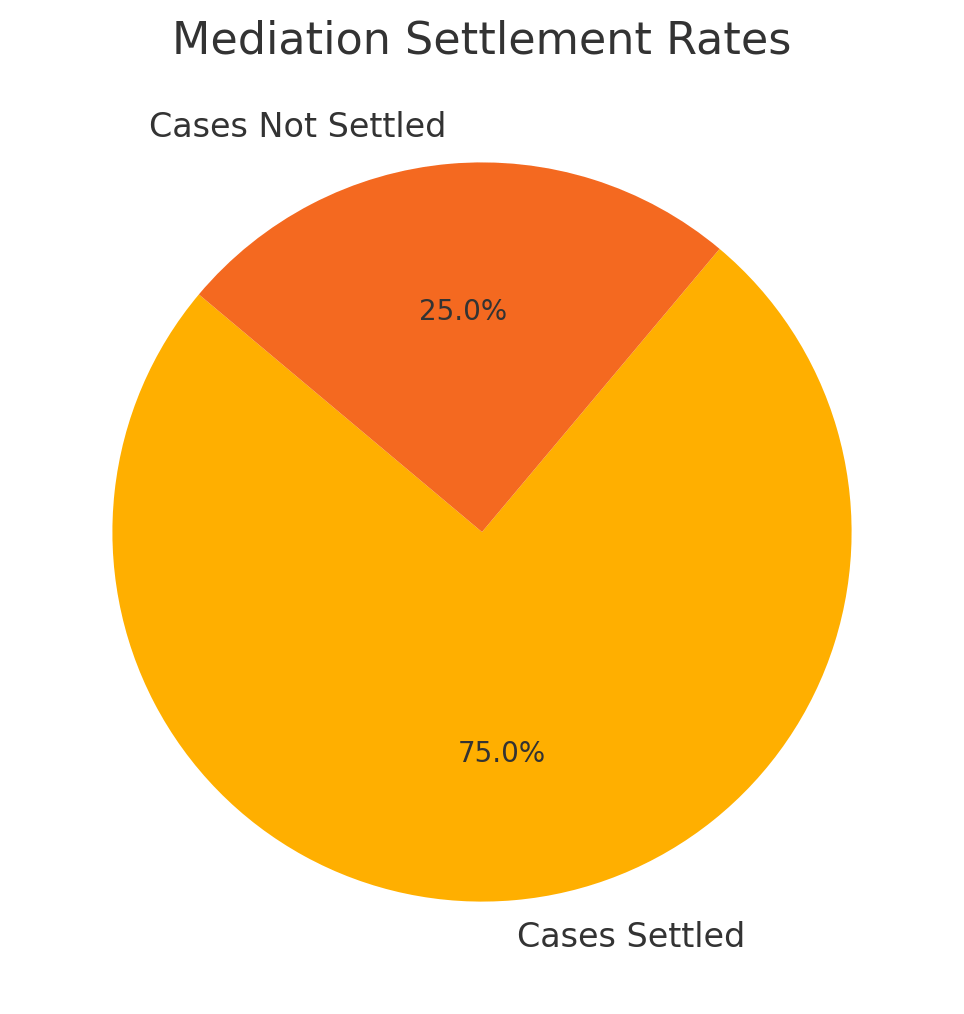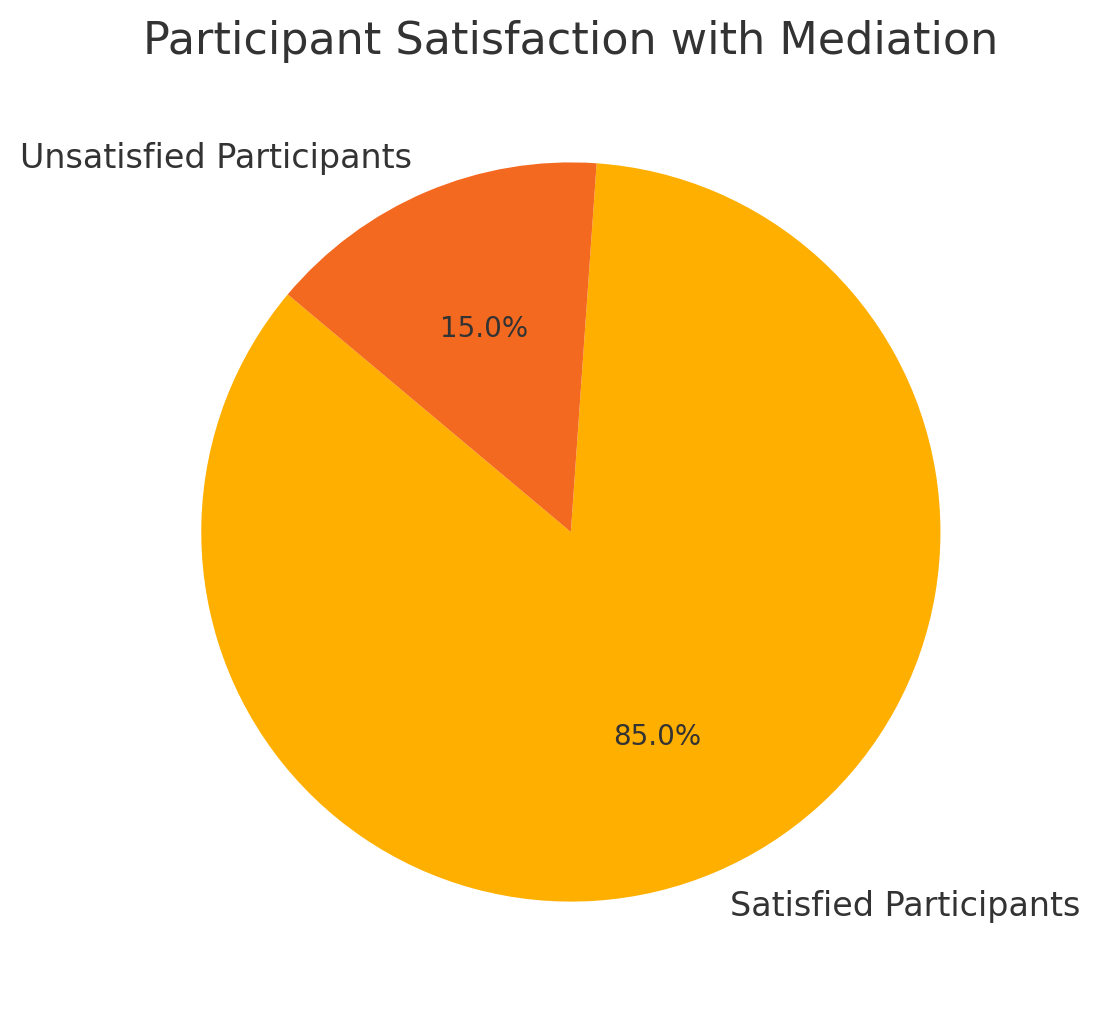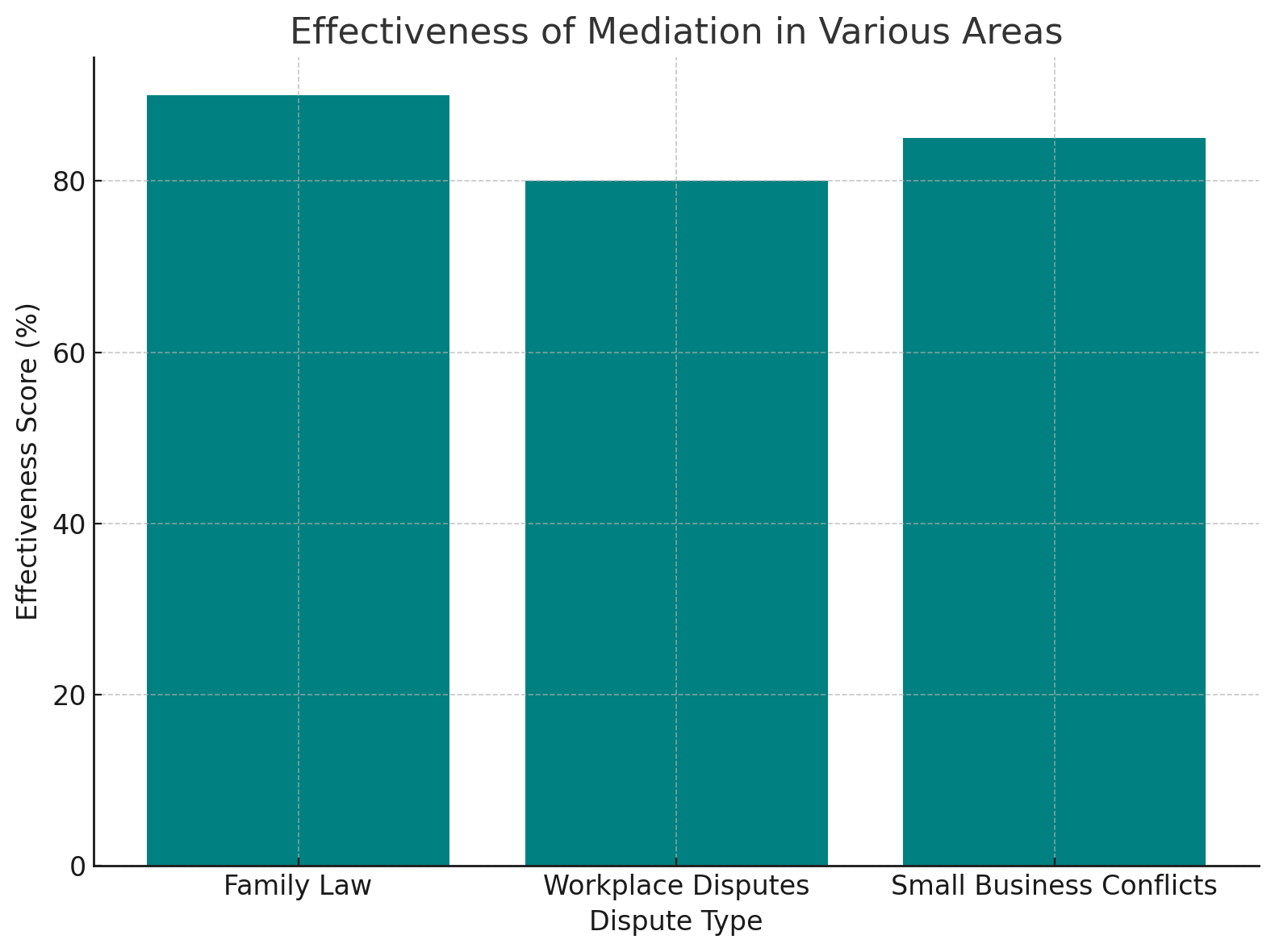Divorce Mediation Lawyers in
Rockville, MD
Divorce can be complicated. It is not just about separating from your spouse. It also includes potentially life-altering decisions, like your splitting up assets, property division, support payments, and child custody. We understand that this is an emotional and stressful process. Our compassionate Rockville, MD divorce mediation lawyer is here to help. At Fait & DiLima, LLP, our lawyers have over 120 years of combined experience in family law. We are committed to securing an optimal outcome for our clients and will be your trusted advocate through every step of your divorce.
While mediation is voluntary, Maryland family courts encourage couples going through divorce to try this method before initiating litigation.
Advantages of Divorce Mediation
Going through a divorce is hard enough as it is. Do you really want to go through a lengthy and stressful court proceeding as well?
The purpose of divorce mediation is to find agreements instead of allowing the court to make a decision. That gives you several benefits:
- It saves you time and money. Going to court is much more expensive and will demand more of your time.
- The details of your divorce become public record with a court hearing.
- There is less stress and resentment between couples who go through mediation as compared to going to court.
If you need a reliable Rockville divorce mediation attorney, contact the team at Fait & DiLima, LLP to discuss your options for mediation vs. litigation.
The Purpose Of A Divorce Mediator
When you meet with your spouse to discuss the divorce, it’s common to have different opinions. You and your lawyer will want to achieve the best outcome, just as your spouse will with their lawyer. This is a normal part of the divorce process. However, these meetings can be emotionally charged, making it difficult to make progress towards a resolution, especially if you and your ex find it challenging to communicate effectively.
The job of a divorce mediator is to sit in the middle of opposing parties and proceed over their discussion. The mediator is a neutral and unbiased party who is there to guide all parties toward fair and amicable decisions over the different topics they have to discuss.
While mediators are there to guide the conversation, they cannot make decisions for the parties involved. For example, if there is an argument about a piece of property, the mediator cannot dictate who will get what. The mediator’s authority is limited to guidance.
After the mediation process, the information discussed is kept confidential. The mediator cannot be called to bear witness in judicial proceedings regarding the information provided during the mediation.
Topics Addressed During A Divorce Mediation
Divorce proceedings include several aspects, including property valuation, asset division, child custody, and spousal support. Any and all of these topics can be discussed and resolved during the mediation process.
Going to mediation is best for situations where:
- You are most concerned with the well-being of the children involved. Court proceedings can be tough for the children.
- You consider joint custody for the children.
- You do not want to spend a lot of money going through divorce litigation.
- You want to remain civil and peaceful and maintain a certain level of control over the situation.
You do not have to force a compromise. The mediator is there to point out facts that could have been overlooked. The goal is for a win-win situation, rather than one side winning over the other.
How Mediation Works In Maryland
Mediation is a valuable alternative dispute resolution process available to divorcing couples in Maryland. It offers a cooperative approach to resolving conflicts and reaching agreements outside of court, facilitated by a neutral third-party mediator. A judge may order you and your spouse to mediation before setting a trial date. Our Rockville, MD mediation lawyer may also recommend it to help you gain more control over the outcome of the divorce and your future.
When you work with our divorce team, we prepare you for mediation and walk you through possible scenarios. Here’s how mediation works in Maryland and why it may be beneficial for your divorce.
Process Of Mediation In Maryland
The process starts with selecting a mediator. In Maryland, mediators are typically trained professionals with experience in family law and conflict resolution. Both parties, along with their respective divorce attorneys, select a mutually agreeable mediator or may be assigned one by the court.
In the initial meeting, the mediator explains their duty and what to expect during the mediation process. They verify that both parties understand that the goal is to work collaboratively to find mutually acceptable solutions to divorce-related issues. They can help identify and prioritize the issues that need resolution, such as child custody and visitation, division of property and assets, spousal support, and any other relevant matters.
Throughout the mediation sessions, the mediator facilitates discussions between the parties. They encourage open communication, clarify misunderstandings, and guide negotiations to help parties explore options and find compromises.
Once agreements are reached on all or some of the issues, the mediator drafts a written agreement detailing the terms. This document is not legally binding until it is reviewed and approved by each party’s attorney, signed by both parties, and approved by the court. In Maryland, mediated agreements must be reviewed and approved by a judge to confirm they meet legal standards and are in the best interests of any children involved. Once approved, the mediated agreement becomes a binding court order.
Benefits Of Mediation
Our Rockville mediation lawyer may point out some of these benefits of mediation:
- Mediation allows parties to maintain control over the outcome of their divorce rather than leaving decisions solely in the hands of a judge.
- Mediation is often more cost-effective than litigation, as it typically requires fewer court appearances and legal proceedings.
- Mediation sessions are confidential, fostering a safe environment for open dialogue and negotiation.
- For couples with children or ongoing co-parenting responsibilities, mediation can help preserve a more amicable relationship, which is beneficial for future interactions.
Legal Assistance In Mediation
While divorce mediation is a voluntary process and parties can participate without attorneys, having legal representation can provide invaluable support. Our experienced divorce attorney can:
- Offer advice on legal rights and obligations, so that you make informed decision-making during negotiations.
- Carefully review mediated agreements to make sure that they are fair, comprehensive, and legally sound before they are finalized.
- Represent you in court to seek approval of mediated agreements and handle any legal complications that may arise.
If you are considering mediation for your divorce in Maryland, Fait & DiLima, LLP, is here to help. Our skilled Rockville mediation lawyers are experienced in mediation and can guide you through the process to achieve a fair and mutually beneficial resolution. Contact us today to schedule a consultation and learn more about how we can assist you in finalizing your divorce through mediation.
Rockville Mediation Infographic
What To Expect During Your First Mediation Session
1. A More Positive Collaboration
Mediation offers a less adversarial approach to resolving divorce disputes compared to traditional litigation. Working with our Rockville mediation divorce lawyer can help create a more collaborative environment where both parties have the opportunity to discuss their issues openly. Mediation often leads to solutions that are more satisfactory to all involved, as it encourages mutual agreement rather than a win-lose scenario.
2. Saving Time And Money
One of the key advantages of mediation is that it can be a quicker and more cost-effective way to resolve disputes. Legal battles can be drawn out over months or even years, but mediation can often be completed in a matter of sessions. By opting for mediation, we can avoid many of the court fees and expenses associated with prolonged litigation. Our divorce attorney can guide you through this process efficiently, helping to keep costs down and timelines short.
3. Maintaining Privacy Through Mediation
Unlike court cases, which are public record, mediation sessions are private and confidential. This means that the details of our disputes and the eventual resolutions remain between the involved parties. For those of us who value our privacy, this aspect of mediation is particularly appealing. Our lawyer will help facilitate these discussions in a controlled environment, so that your privacy is respected throughout the process.
4. Mediation Is Less Stressful
Courtroom battles can be stressful and emotionally taxing for everyone involved. Mediation, on the other hand, encourages a more peaceful resolution process. By working with our divorce attorney, you can approach disputes in a way that minimizes conflict and stress. This strategy often leads to better long-term relationships between the parties, which is especially important in cases involving family law or ongoing business relationships.
5. Customizable Solutions Through Mediation
One of the most significant advantages of mediation is the ability to create customized solutions tailored to the specific needs of both parties. Unlike court rulings, which are bound by legal precedents and strict guidelines, mediation allows us to develop agreements that work best for our unique situations. Whether it’s a family dispute, business disagreement, or any other conflict, our mediation attorney can help craft a solution that meets everyone’s needs.
Moving Forward With Mediation
Choosing mediation is a smart way to resolve disputes while maintaining control over the outcome. If you’re facing a conflict and are considering your divorce options, working with our qualified Rockville mediation lawyer is a step in the right direction. Fait & DiLima, LLP is dedicated to helping clients find peaceful, efficient, and fair divorce resolutions through mediation. Contact us today to learn more about how we can assist you in finding the best possible solution for your situation.
Rockville Mediation Infographic
Rockville Mediation Statistics
Mediation is a widely used form of alternative dispute resolution (ADR), resolving disputes efficiently and cost-effectively. Studies show that 70-80% of mediation cases reach a settlement, with 85% of participants reporting satisfaction with the process.
Mediation is particularly effective in family law, workplace disputes, and small business conflicts. It is faster than litigation, typically concluding within weeks or months, compared to years in court. Costs are significantly lower, often saving parties 50-80% compared to traditional legal proceedings.
How Mediation Differs From Court
At Fait & DiLima, LLP, we often get questions about how mediation compares to going to court. Both processes offer ways to resolve disputes, but they differ in significant ways. Mediation is an alternative to litigation that can be faster and less stressful. Here are five common questions about how mediation differs from court, which can help you decide the best path forward.
How Is Mediation Less Formal Than Court?
Mediation tends to be less formal than court proceedings. In mediation, the setting is typically a conference room or private office rather than a courtroom. There’s no judge or jury, and the mediator’s role is to facilitate discussion between the parties. Everyone involved is encouraged to communicate directly to find a resolution. Court, on the other hand, involves strict rules of procedure and evidence, which can feel rigid and overwhelming for those unfamiliar with the legal process. Mediation allows for a more comfortable environment, giving both sides the chance to speak freely and find common ground.
Is Mediation Typically Faster Than Court?
Yes, mediation is generally much faster than court litigation. Court cases can take months or even years to resolve due to backlogs, formal procedures, and the need for multiple hearings. Mediation, however, can often be scheduled quickly, and many cases are resolved in just a few sessions. Our divorce lawyer can guide you through the process efficiently, helping you to reach a resolution without long delays. This makes mediation appealing for people who want to settle their disputes without getting bogged down by the court system.
How Does The Cost Of Mediation Compare To Court?
Mediation is usually more cost-effective than going to court. Because mediation moves at a quicker pace, the overall costs—including legal fees and administrative expenses—are often lower than those associated with a drawn-out court battle. In court, costs can increase as the case drags on due to additional filings, hearings, and preparation time. Mediation offers an opportunity to resolve disputes with fewer legal and court fees, which can be a significant advantage for clients in Rockville looking for an alternative to litigation.
Do We Have More Control Over The Outcome In Mediation?
Yes, one of the key differences between mediation and court is that the parties have more control over the outcome in mediation. In court, a judge makes the final decision, and you have little say in the matter once the ruling is handed down. In mediation, both parties actively participate in finding a solution that works for them. This collaborative approach often leads to agreements that are more satisfactory to everyone involved. It also allows for creative solutions that may not be normally considered by the court.
Can Mediation Still Be Used If We Don’t Agree On Everything?
Mediation doesn’t require you to agree on every issue from the start. It’s a process that encourages discussion and compromise. Even if there’s disagreement at the beginning, many parties find that mediation helps them move closer to a resolution as the sessions progress. In situations where the parties cannot agree on all terms, the unresolved issues can still be taken to court if necessary. However, by working with our mediation lawyers, many clients find that they can reach an agreement on key issues without the need for litigation.
How Long Is Divorce Mediation?
The length of the mediation process depends on several factors. These include:
- How you are able to communicate and listen to the other people in the room.
- How you and the other party follow the directions of the mediator.
- Your willingness to reach a fair compromise.
A normal mediation session would take two hours. The number of sessions required would depend on the factors above and the number of family matters to settle.
Speak With Our Mediation Lawyer
Fait & DiLima, LLP’s divorce lawyers are experienced in providing unbiased and neutral proceedings. If you believe you and your spouse can remain civil during divorce proceedings, mediation can save you time and money. Our goal is help you divorce with dignity. Contact our office today to book a consultation with our reliable Rockville divorce mediation lawyer. Whether you are contemplating divorce or ready to file, our team will guide you in making the best decision for you and your family. Don’t wait to get the legal support you need. Call now to get started.
Resources
Contact Us
Ready to take the next step? Complete the form below to connect with Fait & DiLima, LLP.


